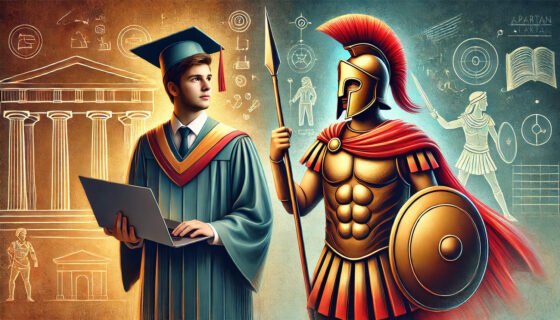Bear Howard Chronicles
Sedona, AZ — As Sedona.biz‘s resident philosopher, I want to share a historical perspective that has yet to receive much attention in the media. This perspective, while it may seem intellectual, is not just a matter of academic interest. It’s a crucial lens through which we can understand and navigate the complexities of today’s events.
With the November election approaching, I see striking parallels between the current unrest in America and the Peloponnesian War, a significant conflict that occurred over 2,000 years ago in 432 B.C. The war was fought between the powerful city-state of Athens and its empire against the Peloponnesian League, led by Sparta. Just as the Greek city-states were divided then, America today is split between two competing ideologies.

In ancient Greece, Athens was a thriving democracy focused on education, philosophy, and economic growth—think of it as the progressive side of the equation. On the other hand, Sparta was all about military strength, fearing the ambitions of its more forward-thinking neighbor. This divide echoes today’s political landscape, where one side expresses concerns about losing traditional values, seeing America as a predominantly white Christian nation that is drifting away from its roots.
They often lament a perceived decline in military power and global respect.
Conversely, the left critiques this traditional viewpoint, advocating for “woke” ideologies that seek to reshape education and societal values. This ongoing struggle highlights a timeless conflict between tradition and progress. Like ancient Greece, where Athens symbolized innovation, and Sparta represented conservatism, our modern society reflects this same divide.
As we approach the November election, we find ourselves at a crossroads, much like the Greeks during their conflict. The stakes are high, and the outcome will undoubtedly shape our future. The unrest we are experiencing today serves as a reminder that history often repeats itself.
In essence, America is at a pivotal moment, and the upcoming elections are not just another political event. They may serve as a turning point, similar to significant historical events, and the decisions we make will shape our future.
The lessons of history are not just distant echoes. They are woven into the fabric of our society, reminding us that our challenges are not new and that we are part of a continuous narrative that stretches back to ancient times.
Bear Howard






2 Comments
The global history of world politics and democracy have very little to do with the history of US politics other than the founding fathers using some (very few) ideals borrowed from Ancient Greece, Rome and even the UK.
Here is some much more relevant information on US politics-
George Washington:
His thought, in what became known as the Farewell Address in 1796, is clear: “the spirit of party”
serves always to distract the public councils and enfeeble the public administration. It agitates the community with ill-founded jealousies and false alarms, kindles the animosity of one part against another, foments occasionally riot and insurrection.
Throughout his political life, and until his death in 1799, George Washington was confident that the country could and should function without the existence of political parties
And here we are today. We have exactly what Washington and most other founders feared most! Political Parties and Political Corruption!
Yes indeed! There are many things our founders warned against to include becoming a tyrannical monarchy like ill Douchebag is lusting for. The Federal Government was intended to protect ALL Americans from biased, racist, misogynistic presidents with a desire to be a term less permanent Monarchy like the one they fled!